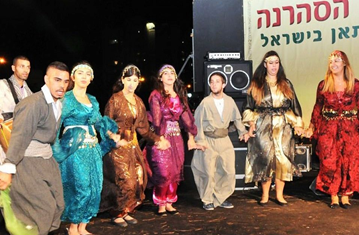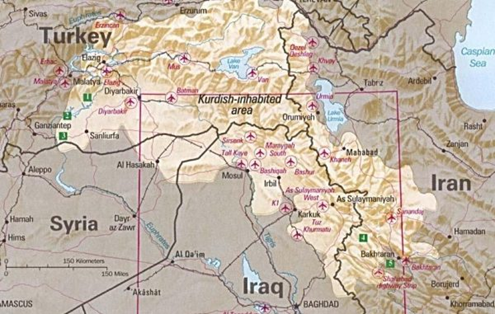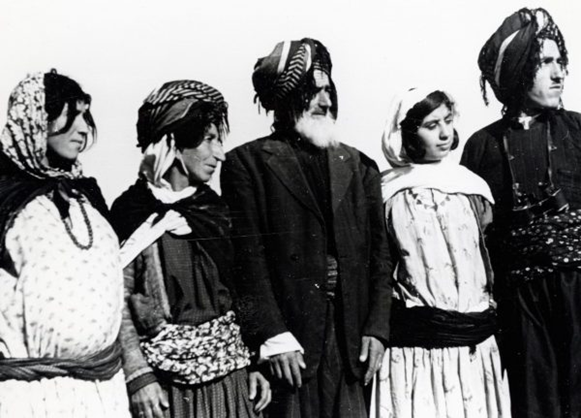Every Sukkot, the Kurdish Jews of Israel gather to dance, eat delicious
foods and share stories about their homeland — the historic Kurdistan, now divided between Turkey, Syria, Iran and
Iraq — in the Saharane festival.
The Saharane festival was historically celebrated around springtime and is
similar to the Newroz festival, which has Zoroastrian origins and is
celebrated by diverse communities in western and central Asia to mark the
beginning of spring and the blossoming of nature after winter. Saharane
celebrations take place in various cities in Israel, with the biggest
gatherings in Jerusalem drawing around 13,000 attendees.
Today, there are around 200,000 Jews living in Israel coming from Arab,
Persian, Turkish and Kurdish lands, with the largest migration having taken
place between 1948 and 1950. Currently, there are only around 500 Jewish families remaining in what is
modern Iraqi Kurdistan. Why did the Jews of Kurdistan leave their homeland
and settle in Israel?
The departure of Kurdish Jews from Kurdistan
Kurdistan is a geo-cultural historical region in which the Kurdish people
form the majority population. The modern use of the term refers to
southeastern Turkey (Northern Kurdistan or Bakurê Kurdistanê in Kurdish), northern Syria (Western Kurdistan or Rojava), northern Iraq
(Southern Kurdistan or Başûrê Kurdistanê), and northwestern Iran (Eastern Kurdistan or Rojhilatê Kurdistanê).
The modern-day region of Kurdistan. Via Wikimedia Commons.
Though nationalist Kurdish organizations have tried to gain independence or a certain level of autonomy, especially throughout the 20th
century, Iraqi Kurdistan, known as the autonomous Iraqi Kurdistan region, is the only autonomous
Kurdish region today.
On the eve of Israel’s establishment, about 25,000 Jews lived in
Kurdistan. The majority of Kurdish Jews were located in Iraq and lived in
harmony with their Kurdish Muslim neighbors. They spoke Aramaic, which had
been the lingua franca of the Middle East before Arab armies conquered
Mesopotamia in the 7th century.
Immigration to the land of Israel/Palestine began as early as the 16th
century, but it was not until the early 1950s that the majority of Kurdish
Jews left historic Kurdistan. That was when the Iraqi government passed laws canceling citizenship and freezing the property and
assets of many Iraqi Jews.
The passage of these laws coincided with a series of bomb attacks on Jewish synagogues, cafes and other targets of Jewish life in
Baghdad. The influence of Nazi doctrine became increasingly apparent in
public speeches in Iraq and gained popularity among the general
population.
In 1948, Iraq was among several Middle Eastern countries that declared war against the newly established state of Israel. This was a major
turning point for the Jews of Iraq and for Jews all over the Middle East.
As conditions deteriorated for Jews in Iraq and other Middle Eastern
countries, Israel passed the Law of Return, which allowed Jews all over the world to immigrate to Israel.
With the (financial) help of the American Jewish Joint Distribution Committee, also known as the JDC, over 120,000 Iraqi and Kurdish Jews were
airlifted to Israel. This massive emigration in the early 1950s came to be
known as Operation Ezra and Nehemiah and paved the way for later airlifts of Jews in the Middle East and
all over the world.
Kurdish-Jewish life in Israel today
Today, the largest concentration of Kurdish Jews is in Jerusalem. While
many of the Kurdish immigrants who came to Israel had an agricultural
background and integration into urban life in Israel was hard at first,
the majority of Kurdish Jews today define themselves as Israeli and have
adopted Hebrew as their primary language. Intermarriage between Jews of
various ethnic background is also increasing in Israel.
The Saharane festival has remained an integral part of Kurdish-Jewish
life in Israel today and is celebrated by people of all ages. Just as they
did in their historic homeland, Kurdish communities gather and spend their
days together singing, dancing and sharing traditional Kurdish dishes.
In addition to keeping Kurdish traditions alive, the festival is used as
an opportunity for the community to highlight and celebrate Jewish Kurds
who have attained important positions in Israeli society. Examples include
Itzik Kala, an Israeli singer of Kurdish descent who sings in Aramaic, Kurdish and Hebrew and who has released 30 studio albums to date, and Moshe
Barazani, an Iraqi-born Kurdish Jew and member of the Olei Hagardom, the Jewish underground fighters executed by the British in Mandatory
Palestine, who are memorialized and widely commemorated as national heroes
in Israel today.
The past few years have seen an emergence of organizations that foster Kurdish-Israeli relations, such as the Kurdish-Israeli
Friendship Association or Jewish Coalitions for Kurdistan. The founder of
Jewish Coalitions for Kurdistan stated: “There is a kinship between the two peoples, the Jewish one and the
Kurdish one, that transcends merely political calculus. We are two nations
of several million people who by and large both stand for Western values
such as tolerance, progress, equal rights for women and who, in the Middle
East and beyond, stand up to tyranny and fanaticism.”
Fostering Kurdish-Israeli connections
Many of the almost 200,000 Kurdish Jews in Israel and their descendants
have integrated fully into Israeli society. Yet, they continue to have a
strong cultural connection to their homeland and remain highly political.
This became especially apparent when Iraqi Kurds voted for independence in
a nonbinding referendum and Kurdish Jews in Israel gathered in Jerusalem’s Independence Park in support of independence. Increasingly, Muslim Kurds are also
visiting their old neighbors in Israel for special gatherings like
the Saharane festival.
The ties between Kurds in Israel and the Kurdish heartland have deepened,
and Kurds in both areas promote cultural initiatives. Although there are
some political initiatives that push politicians in Israel and the Kurdish
Regional Government to expand on their official support of each other, the motivations behind these initiatives are often cultural and nostalgic. Many of the Kurdish Jews in Israel just hope to explore their family
roots, visit their childhood friends and celebrate the Saharane festival
with their Muslim Kurdish, Muslim Iraqi and Israeli Jewish friends in
hopes of a multicultural and peaceful Middle East.
Copas dari https://jewishstudies.washington.edu/global-judaism/kurdish-israeli-jews-kurdistan-saharane/












No comments:
Post a Comment